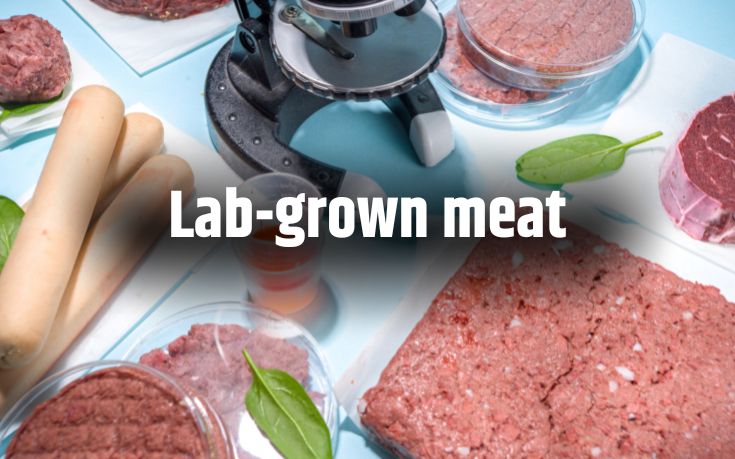Hello, foodies and eco-readers! Today, we chew through one of the hottest debates in the food industry: Is lab-grown meat truly organic? While it’s another attempt on the journey toward sustainable and ethical sourcing of food, lab-grown meat—also known as cultured or cell-based meat—appears to be a game-changer. But can it squeak under the small umbrella of organics? Let’s dissect this interesting issue and see what it’s made of.
Lab-Grown Meat
Essentially, lab-grown meat is developed by the culture of animal cells in a controlled environment, simulated within a laboratory. First of all, an infinitesimally small sample from the animal cell is isolated and dunked into a nutrient-rich solution to let the cells multiply and grow into bigger numbers. After some time, these cells will grow large enough in number to make up muscle tissue. Afterwards, this tissue is harvested and thereafter processed into meat products. Unlike traditional animal husbandry, the process of growing organs in the laboratory does not involve rearing and killing animals.
The approach targets not only the reduction of the ecological footprint from meat production but also seeks an answer to mitigate the animal welfare concern and thus helps produce a sustainable protein source for an ever-growing population.
What Does Organic Mean?
]Whether or not lab-grown meat is organic may be determined by whether or not it is actually “organic”. Organic farming is coined under strict standards focused on sustainability and eco-friendly methods. Some of the key tenants to organic farming include:
Organic certification varies internationally, as there are several organizations and even governments that have authority over the specific criteria farmers must adhere to. The general vision of organic farming is to have a holistic and sustainable food system that benefits the people and the planet.
The Organic Debate on Lab-Grown Meat
The foremost arguments in the debate are in respect of whether lab-grown meat could be termed as organic or not. The first, rather obvious, reason is that such meat does not strictly fall under the traditional or earlier framework of organic farming. Organic implies practices related to farming, involving possibilities for the cultivation of crops and rearing of animals within natural settings.
In the case of lab-grown meats, these are grown in labs using bioreactors. Dimensional critics grieve over the loss of relationship to soil, ecosystems, and historic agricultural traditions, this being so central to organic principles. Besides, nutrient solutions used to culture the cells may contain synthetic ingredients or be grown from genetically modified organisms—two things not allowed in growing organically.
Environmental and Ethical Considerations
On the other hand, the proponents of lab-grown meat counter-argue by saying that it is in line with the goals of the whole organic movement. Lab-grown meat can lead to big reductions in the environmental stress and impact that arise from the process of producing meat. The conventional practice involves the rearing of livestock which is quite resource-intensive leading to deforestation, greenhouse gas emissions, and water pollution. Lab-grown meat can avoid all the environmental problems above since it eliminates the large requirements for animal farming.
Another issue on ethical grounds has been the issues of animal welfare, thus giving a solution to eliminate the process of rearing and killing animals. In these ways, one could argue that in-vitro meat addresses the purposes of the organic movement if not necessarily in spirit
Technological and Health Perspectives
Another front touched on in the debate is the aspect of technological innovation: proponents of this protein source say that man has to adopt new food technology as a way of achieving a much more sustainable, more efficient food system. Lab-grown meat is a huge scientific breakthrough that can help in solving the problem of meat supply to the world’s exponentially growing population without causing serious effects on the environment as compared to the adverse effects attributed to conventional meat production.
Of more health concern is the fact that lab-grown meat could be manipulated to give specific nutritional profiles other than those present in conventional meat, hence offering better choices that are healthier.
For instance, the maximal and minimal amounts of saturated fats can be set and beneficial nutrients increased in content to yield a product that meets the consumer’s dietary needs.
Regulatory and Certification Challenges
The legislation regarding cultured meat is still progressing, so it proves somewhat difficult regarding its organic classification. Present organic certification standards have no existing provisions for cultured meat production since they were developed with traditional farming practices in mind. To be certified organic, the producers themselves would have to work with the regulatory bodies to come up with specific guidelines outlining the unique nature of this technology.
Therefore, it would be very much a collaborative effort with scientists, policymakers, and organic-certifying organizations to set the standards for the final lab-grown meat to be as sustainable, healthy, and ethical as has been the natural organic label. This is likely to be inherently time-consuming and perhaps a little conflicted, in turn balancing innovation against organic farming principles.
Consumer Perception and Market Impact
The organic debate rests largely on the perception that consumers have. It is not a realistic and more sustainable method of getting meat unless consumers buy into that image of cultured meat. But this will require transparency in the process, transparent labeling, and education of the benefits to the consumers.
The ‘organic’ label is very important to many consumers, where it is seen as a promise to deliver healthy, sustainable, and ethical practices. If the lab-grown meat industry can meet these expectations and be considered organic, this would provide greater support from the vast majority of consumers who want to see more organic options. Is Lab-Grown Meat Truly Organic? The Debate Heats Up
Final Words
Ultimately, the future of cultured meat will depend on innovations, collaboration, and consumer acceptance.
That is called openness to this technology and the realization of its possibilities—quite possible that we can innovate in developing a perfect food system to the benefit of all, making the world better for both humans and nature.
So the next time you think about food choices, remember the shifting tectonic plates of arguments against lab-grown meat and how it’s going to change the way we think about organic food. Together, we can get to good choices for a healthier, sustainable future.

